The Numbers in Yesterday’s Contests
I know that Doug Mataconis has already noted the turnout figures, but I like the way Ron Elving put in it in a write-up for NPR:
Not only was the Missouri vote a "beauty contest," binding no delegates, but the turnout there was less than 6 percent of the voting-age population — a paltry number for a statewide primary. Moreover, Missouri’s results were a bit askew because Gingrich did not get on the ballot.
In Minnesota, a state of about the same population, the party caucuses drew just over 50,000 participants (about a fifth as many as in Missouri). That was a little over 1 percent of the voting-age population. Again, no commitment of delegates.
In Colorado, again a state of roughly 5 million people, about 65,000 turned out, but that was still well below 2 percent of the voting-age population.
This, my dear commenters to James Joyner’s post on this subject, is why one cannot draw substantial conclusions from yesterday’s contest.
As Elving notes (and correctly, in my view):
That’s not much of a plebiscite. And it could be a poor indicator of the sentiment of most Republicans and independents. What it measures instead is the ardor of that fraction of the GOP vote that is willing to turn out for a nighttime caucus where no delegates are actually being decided.
Yes, this gives Santorum a boost, but it does not demonstrate some massive Santorum surge nor does it mean that Romney is on the rocks.
And by the way, lest anyone think that I am arguing this position because I am in the tank for Romney and therefore am motivated to downplay non-Romney victories, let me note that this is not the case. I am simply calling it like I see it.

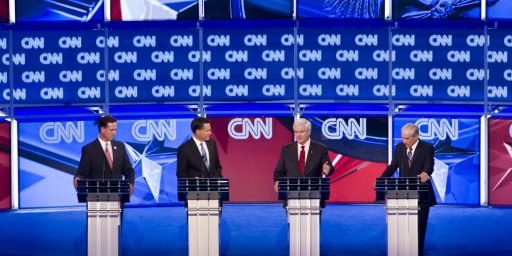
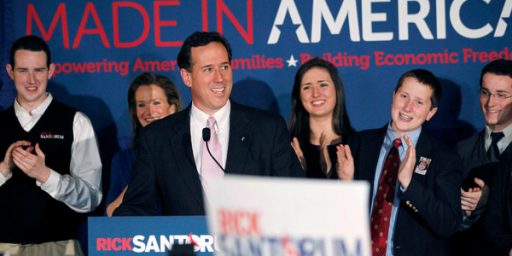
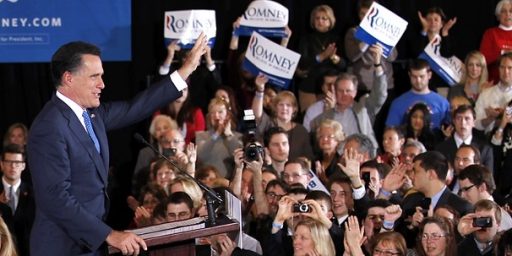
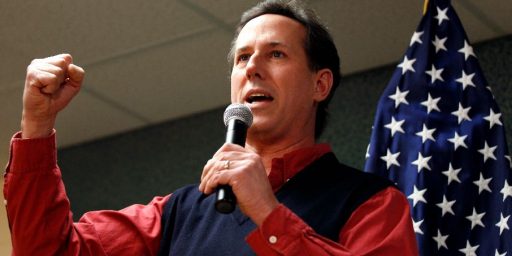
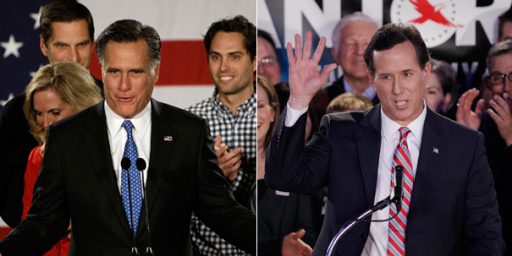
Steven you keep framing this as a debate about the inevitability of Romney which I for one would not for a moment dispute. And yes the numbers are small as percentage of the electorate but they were small in the same way last time when Romney comfortably won two of these contests. Do they mean that Romney isn’t still almost certainly going to be the nominee? Of course not. But as a window into Republican discomfort with Romney they are freighted with considerable significance.
Sure we can, like this: Romney is not liked by large numbers of the GOP.
It is pretty easy to scoff at the numbers, but please consider that first, this is a primary, and second that caucuses generally have much lower turnout simply because they are at a set time that doesn’t work with everyone’s schedules.
First hand reports here in Colorado three sources in 3 different precincts indicated that at least in those three locations, rooms were overcrowded. For all the whining about turnout and throwing around facts and figures, I believe it was higher than expected – at least here in Colorado.
@Brummagem Joe:
And what would that significance be?
That there is a segment of the party that prefers someone beside Romney? We’ve known that for months (over a year, in fact).
@Gold Star for Robot Boy:
First, I am not sure that the numbers in question from these three contests qualifies, in a relative sense, as “large.”
Second, so what? There are always a large number of partisans who don’t want a particular candidate to be the nominee. The Dems were more split in 2008 than the Reps are now.
@Steven L. Taylor:
Critical mass.
@Steven L. Taylor:
That Romney may have a difficult time getting Republican voters to volunteer their time, open their wallets and cast their ballots for him.
No, nothing of significance there.
@Steven L. Taylor: I think that the difference is that most Dems in 2008 were strongly *for* one of the two options more than they were strongly against the other option. In other words, most Obama supporters still viewed Clinton positively and vice versa. Whereas here we have a case where it seems like the majority of Republicans don’t view any of the remaining candidates positively, even (except Paulites) the one they claim to support. And that lack of enthusiasm has a huge potential November impact.
@Steven L. Taylor:
Jeez Steven, no it’s not large in absolute numbers or relative to the total electorate, but it’s a measure of more less the same data set from four years ago.
@Blogrescue: Yes, but these are pretty anemic numbers in general. More to the point, however, the low-turnout nature of caucuses is why they are largely discounted (with the glaring exception of Iowa). They simply don’t provide a lot of useful information.
This may well have been the case. However, I am not sure that they enhances the significance of the information provided by the contests.
@Brummagem Joe:
I have no idea what that means in this context.
@Brummagem Joe:
Yes, but that is rather my point.
@Steven L. Taylor:
You have any data* to back up this assertion? Because that is definitely not how I remember things.
* – Data must account for the Dem race having two candidates after 1-30-08, while the current GOP campaign has four candidates.
@Steven L. Taylor:
While totallly ignoring the fact that this is a measurement of essentially the same data set from four years ago (Motivated Republican Voters) which shows a precipitate decline in Romney enthusiasm.
@Gold Star for Robot Boy:
You may recall the substantial split between Obama supporters and Clinton supporters at this time in the 2008 primary. There is no such strong contest in the GOP primaries at the moment.
Exactly. It’s always been my contention that the pundits misread the 2008 primaries as “dividing” the Democratic base, when really it was an argument over *cough* chocolate or vanilla. Democrats still really like ice cream compared to any flavor of pudding.
In comparison, this seems to be all-out pudding warfare.
@Gold Star for Robot Boy:
It did. Obama and Clinton campaigned against each other at least until April or May, if memory serves.
Great graphic showing the extent of Romney’s CO/MN/MO cratering.
(H/T: Think Progress via Sully)
@Steven L. Taylor: Yes, I do remember “the substantial split between Obama supporters and Clinton supporters.” And I also recall once the matter had been decided, there was little doubt the Hillary backers were going to do everything they could to get Obama elected.
You really think Newt’s people in South Carolina, or Santorum’s followers in Missouri, will go to the mat for Romney?
@Tillman: Oh, I know. (Even looked up the date of Edwards’ drop-out!) The point I was trying to make is, in a two-horse race, backers have Our Guy and The Other Guy; currently, with four GOP candidates, we’re still at Our Guy and Everyone Else…
You know, I still don’t think I’m making my point. Something about binary choices vs. a selection. I dunno…
@Blogrescue:
The 2008 Colorado Republican caucuses were held on February 5, a Tuesday.
The 2012 Colorado Republican caucuses were held on February 7, a Tuesday.
In 2008 70,229 participated, in 2012 32,984 participated.
The turnout for this year’s caucuses are being compared to the turnout for the 2008 caucuses, nothing else.
And anecdotal evidence is fun and all that, but that’s it. The full numbers paint quite a different picture.
I’m happy to stand corrected, although I heard the 2012 number in Colorado was 65k+, and not a mere 32k.
What Steven seems to be in denial about here is that these function as very rough and ready opinion polls with a large sample and a datum point. Before anyone jumps all over me I’m not suggesting they are remotely scientific but measuring these kind of shifts in product preferences with the same sets of people are not uncommon in market research. Saying it’s only a minute portion of the electorate is true but it was a minute share of the electorate four years ago. It’s a sample, not at all scientifically arrived at, but not without some merit as an indicator of opinion shifts.
@Gold Star for Robot Boy:
On balance, yes, they will. This is the way these things tend to work.
@Brummagem Joe:
What Steven is confused about is what your argument is (or, at least, what your point is).
I haven’t the foggiest idea what I am supposedly denying. Yes, new contests equal more data. The question is what the data tell us.
I simply do not think, for a host of reasons (some of which I have tried to elucidate) that despite Santorum’s wins that there is no reason to assume that Romney’s path to nomination has been especially affected (a view you seem to agree with, although, again, perhaps I am confused).
And since the purpose of this process is to pick the nominee, my view is that the most salient issue is how a given set of contests influence that outcome.
@Steven L. Taylor:
We’re talking intensity Steven. Don’t misread me again I’m well aware of what I call the Landon factor and that ultimately tribalism is a very powerful motivator but suppose there’s a 5% decline in the conservative vote that’s 57 million versus McCain’s 60 million.
@Steven L. Taylor:
The scale of Republican discomfort with Romney and its implications? Even if he wins the nod.
@Brummagem Joe: I don’t necessarily disagree with your basic position (although I think you are underestimating the importance of GOP unhappiness with Obama).
My fundamental point is that the contests last night are sufficiently weak as to not provide significantly new information. As I keep trying to say, I don’t think that we learned anything new yesterday. And, further, the structure of the competitions in question (i.e., low turnout caucuses) helped produce the outcomes.
Also, in re: November, I think two things: that Romney has the best chances of the current GOP field to beat Obama and that Obama is, in my mind, the likely winner.
@Brummagem Joe:
It is problematic to use last night as your measure for this. This is my point. It doesn’t mean that you are wrong about the level of discomfort.
@Steven L. Taylor:
Actually I’m coming around to the view this is somewhat overstated. Sure the hardcore base of 30% or so hate him as do most Republicans in the bible belt but in many other parts of the country the male white blue collar segment is a significant section of the Republican base. I have to believe quite a few of these folks in the midwest at least are questioning the Republican shtick that allowing the US auto industry to go down the tubes was a very good idea not to mention scrapping Medicare and privatising SS and the various shenanigans over unemployment pay. Also if you look at the big guys personal likeability a lot folks rather like him. The highest Republican turnout ever was in 2004 at 64 million, McCain pulled 60 million, so what’s Romney’s draw?
@Blogrescue:
You shouldn’t stand corrected. I should. The 2012 number wasn’t as bad as I wrote, and you’re correct. It was 65,480.